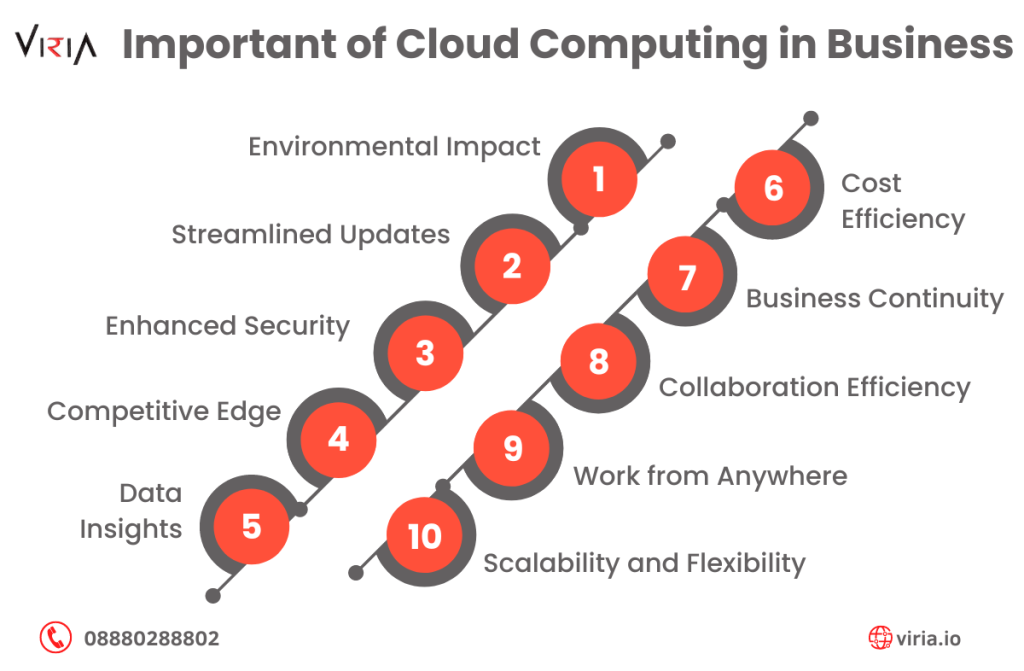In the dynamic landscape of today’s business world, staying ahead of the curve is crucial. One technology that has proven to be a game-changer is cloud computing. The benefits of cloud computing in business are vast, offering innovative solutions to traditional challenges. This blog post explores the transformative power of cloud computing, focusing on its positive impacts on efficiency, scalability, cost-effectiveness, and collaboration.
Efficiency Enhancement
One of the paramount benefits of cloud computing in business is the boost in operational efficiency. Traditional on-premise infrastructure often leads to bottlenecks, hindering productivity. Cloud services eliminate these constraints by providing on-demand resources and scalability.
Benefits of Cloud Computing in Business
- Flexibility and Scalability: Cloud computing allows businesses to scale resources up or down based on their needs. This flexibility ensures optimal performance and prevents unnecessary expenses.
- Resource Optimization: With cloud services, resources are allocated dynamically, ensuring that the right amount of computing power is available at all times. This eliminates the need for overprovisioning and minimizes wastage.
India Cloud Telephony and Cloud Services in India
In the context of India, where businesses are rapidly adopting cloud technologies, the benefits are even more pronounced. India cloud telephony and cloud services in India have witnessed a surge in popularity due to their ability to provide efficient and scalable solutions to businesses of all sizes.
Cost-Effectiveness
Cloud computing offers a significant advantage in terms of cost-effectiveness, a crucial factor for businesses of any scale.
Benefits of Cloud Computing in Business
- Reduced Capital Expenditure: With cloud computing, businesses can avoid the hefty upfront costs associated with setting up and maintaining on-premise infrastructure. Moving towards operational expenses facilitates improved financial planning.
- Pay-as-You-Go Model: Cloud services often operate on a pay-as-you-go model, enabling businesses to pay only for the resources they use. This eliminates the need for long-term commitments and provides cost flexibility.

Advantages of Cloud Computing
Cost Efficiency
Reduction in Costs: Cloud computing can significantly reduce costs associated with purchasing, maintaining, and upgrading IT hardware and infrastructure.
Pay-As-You-Go Model: Users only pay for the services and storage they use, which can lead to substantial cost savings, especially for startups and small businesses.
Scalability
Flexible Resources: Cloud services can be scaled up or down based on demand, allowing businesses to adjust resources as needed without upfront investments.
Handling Load Peaks: Cloud systems are ideal for handling sudden spikes in workload by providing additional resources temporarily.
Accessibility and Collaboration
Remote Accessibility: Users can access data and applications from anywhere in the world, provided they have internet access.
Enhanced Collaboration: Cloud computing facilitates easier sharing and real-time updates of data, improving collaboration among team members.
Reliability and Backup
Data Redundancy and Recovery: Most cloud providers replicate data across multiple servers, ensuring data integrity and making recovery processes more manageable in case of hardware failure.
Automatic Software Updates: Cloud services often include automatic updates of software and systems, reducing the IT workload.
Security
Advanced Security Features: Providers typically offer robust cybersecurity measures that might be too costly for individual businesses to implement.
Regulatory Compliance: Many providers ensure that they comply with legal and regulatory data protection standards, which can help businesses meet their compliance obligations.
Disadvantages of Cloud Computing
Dependence on Internet Connectivity
Connectivity Issues: Access to cloud services is heavily dependent on an internet connection. Any connectivity issues can lead to disruptions in service.
Latency: For operations requiring high-speed processing, the delay caused by data transmission over the internet can be a bottleneck.
Security and Privacy Concerns
Data Vulnerability: Storing sensitive information in the cloud could expose it to cyber-attacks or data breaches.
Control Over Data: Users generally have less control over the security and handling of their data, which can be a concern for sensitive information.
Cost Considerations
Long-Term Costs: While cloud computing reduces upfront costs, long-term expenses can accumulate, especially if service needs are extensive.
Data Retrieval Costs: Some providers charge fees for data retrieval, which can become significant depending on the amount of data involved.
Vendor Lock-In
Switching Challenges: Transitioning services from one cloud provider to another can be complicated and costly, leading to potential vendor lock-in.
Compatibility Issues: Integration with existing systems can be challenging, especially if the existing infrastructure uses significantly different standards.
Limited Control
Configuration Limitations: Customers may have limited control over the configuration and performance settings of the cloud infrastructure.
Dependence on Vendor: The operational capability is dependent on the continued viability of the cloud provider.
In conclusion, while cloud computing offers considerable benefits in terms of cost savings, scalability, and flexibility, it also presents challenges such as potential security risks, dependence on internet connectivity, and issues related to vendor lock-in. Organizations should carefully assess both the advantages and disadvantages in relation to their specific needs and constraints before adopting cloud computing solutions.
India Cloud Telephony and Cloud Services in India
In India, where cost considerations play a pivotal role in decision-making, the adoption of cloud services has become a strategic move for businesses looking to optimize their budgets. The pay-as-you-go model is particularly appealing in a market known for its diversity in business sizes and industries.
Enhanced Collaboration
Collaboration is the cornerstone of modern businesses, and cloud computing facilitates seamless communication and teamwork.
Benefits of Cloud Computing in Business
- Remote Access: Cloud-based solutions enable employees to access data and applications from anywhere with an internet connection. This is especially crucial in today’s era of remote work.
- Real-time Collaboration: Cloud platforms provide real-time collaboration tools, allowing teams to work together on documents, projects, and tasks simultaneously.
India Cloud Telephony and Cloud Services in India
In a country as vast and diverse as India, where businesses may have teams spread across different locations, the collaboration features of cloud computing become paramount. India cloud telephony ensures that communication is not hindered by geographical distances, fostering a more connected and collaborative work environment.
Improved Security Measures
Contrary to common misconceptions, cloud computing can enhance data security when implemented correctly.
Benefits of Cloud Computing in Business
- Data Encryption: Cloud service providers prioritize data security by employing robust encryption methods, ensuring that sensitive information remains confidential.
- Regular Updates and Backups: Cloud providers often include automatic updates and regular backups as part of their services, reducing the risk of data loss due to system failures or cyber threats.
India Cloud Telephony and Cloud Services in India
Given the increasing cyber threats and the need for secure communication channels, businesses in India are recognizing the importance of cloud services. India cloud telephony providers are incorporating advanced security measures to safeguard communication channels, making them a reliable choice for businesses seeking secure communication solutions.
Conclusion
In conclusion, the benefits of cloud computing in business are transformative, offering efficiency, cost-effectiveness, enhanced collaboration, and improved security measures. In a globalized economy, cloud computing has become an indispensable tool for businesses seeking to adapt and thrive in an ever-evolving landscape.
Read also Click-to-Call Solution in Chennai.

